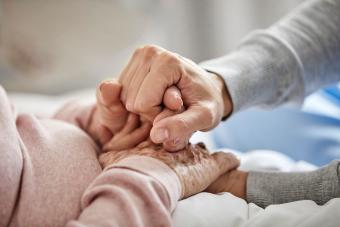
What causes gray hair? That is a question that everyone asks themselves when they start to notice those little buggers popping out in the mirror. The answer to what causes gray hair isn't as simple as you might think. Lots of different factors might be contributing to your new silvery do.
Melanocyte Cells and Gray Hair
As you age, your body goes through many physical changes, including the graying of your hair. Hair turns gray when the cells that produce melanin, the melanocyte stem cells, begin to die. As hair follicles receive less melanin, the substance responsible for your natural hair color, hair loses its natural color, becoming grayer over time. When the melanocyte cells stop producing melanin completely, hair turns white.
Melanin Pigments
Although people have many colors and shades of hair, the melanocyte cells produce melanin in only two basic pigment colors:
- Eumelanin - brown to black
- Pheomelanin - yellow to reddish brown
The blend of the eumelanin and pheomelanin that your melanocyte cells produce determines your natural genetic hair color.
People with blonde hair often seem to gray at a later age than those with dark hair. However, this is not necessarily the case. It is simply more difficult to see the hair follicles that have lost their pigment color in a head full of light-colored hair.
What Causes Gray Hair?
Many scientists believe that genetics is a key factor dictating the age at which a person's hair turns gray. Although many people begin to notice their first gray hairs in their mid to late thirties, there are many people over fifty that still have their natural color hair. However, on the other end of the spectrum are people that begin to go gray when they are teenagers, with some turning completely gray in their early twenties. In most instances, people that experience either premature graying or graying at an older age have family members with similar experiences.
Gray Hair and Medical Conditions
Researchers determined that there are certain medical conditions that may be a contributing factor to patients' hair turning gray faster, and at an earlier age, than would occur if they did not suffer from these conditions. These medical conditions include:
- Coronary artery disease
- Hypothyroidism
- Hyperthyroidism
- Grave's disease
- Hashimoto's disease
- Celiac disease
- Crohn's disease
- Vitiligo
- Tapeworms
- Anemia
- B12 deficiency caused by diet
- B12 deficiency caused by malabsorption
Additional Possible Factors Contributing to Gray Hair
Although most scientists and researchers agree on the roles that the melanocyte stem cells and genetics play in the graying process, there are other possible factors concerning this process where scientists sometimes disagree. The following are several of these areas.
Stress
Many researchers and scientists conduct studies looking for a definitive link between stress and gray hair. Over the years, the results of these studies have resulted in different viewpoints including:
- A combination of stress and genetics causes hair to turn gray
- Stress causes free radicals that damage the melanocyte stem cells, resulting in a decrease of the production of melanin
- Genetics alone causes graying to occur and stress is not a contributing factor
Smoking
Many scientists agree that smoking causes hair to turn gray at an earlier age than it would if the person did not smoke. Smoking causes stress to all of the cells in the body and contributes to premature aging.
Genotoxic Cellular Stress
According to a study carried out by scientists and published in the scientific journal, Cell, genotoxic stress of the cells surrounding the hair follicles results in damage to the follicles' DNA. This damage causes the melanocyte stem cells to produce less melanin. Several examples of the various agents that cause this type of damaging stress include:
- Ultraviolet light
- Chemicals
- Ionizing radiation
Hydrogen Peroxide Build Up in the Body
According to a study conducted in the United Kingdom at the University of Bradford, researchers found that the natural build-up of hydrogen peroxide in the body causes the production of melanin to decrease. Although the human body produces hydrogen peroxide throughout its lifetime, it also produces an enzyme called catalase. The catalase breaks the hydrogen peroxide down into oxygen and water, which the body is able to release. However, with age the production of catalase decreases, causing hydrogen peroxide to accumulate.
Going Gray
Although most scientists agree that genetics plays a key role in the graying process, there are many other factors to consider when answering the question "What causes gray hair?" Talk with your doctor in order to determine what some of the reasons for gray hair in your particular medical profile may be.







